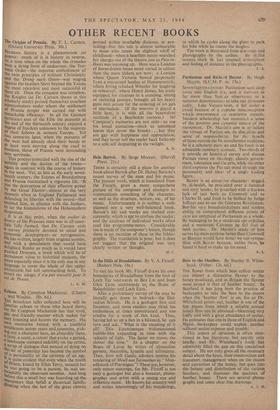The Origins of Prussia. By F. L. Carsten. (Oxford University
Press. 30s.)
PRUSSIAN history is a phenomenon sui generis: much of it is history in reverse. At a time when on the whole the crusades Were a dying form of endeavour, the Teu- tonic Order—the supreme embodiment of the twin principles of militant Christianity and the Drang nach Osten—was waging against the heathen Slays beyond the Vistula the most relentless and most successful of them all. Once the conquest was complete, the Knights (as Dr. Carsten shows in this scholarly study) proved themselves excellent administrators under whom the settlement of Prussia proper was carried out with remarkable efficiency. In all the German territories east of the Elbe the peasants at the end of the thirteenth century enjoyed a degree of freedom unknown to the majority of their fellows in western Europe. Yet two centuries later, when the peasants of the west had already shed their bonds or at least were moving along the road to freedom, those of Prussia were descending into servitude. This process coincided with the rise of the nobility and the decline of the towns— again in contrast with the course of history in the west. Yet, as late as the early seven- teenth century, the Estates of Brandenburg and Prussia maintained a vigorous life. 'It Was the destruction of their effective power by the Great Elector-.-almost at the very Moment when in England Parliament was defending its liberties with the sword—that enabled him, in alliance with the Junkers, to lay the foundations of the Hohenzollern despotism.
L. A. M.


































 Previous page
Previous page